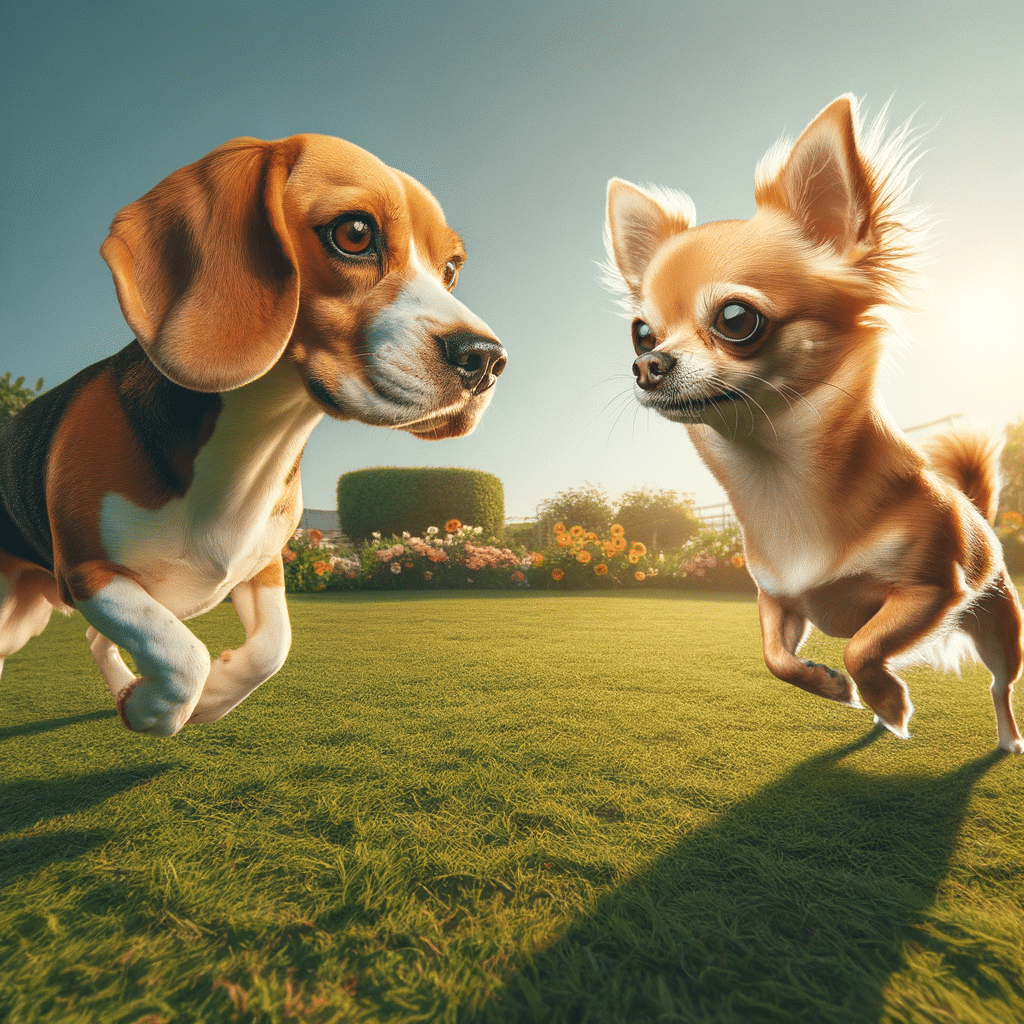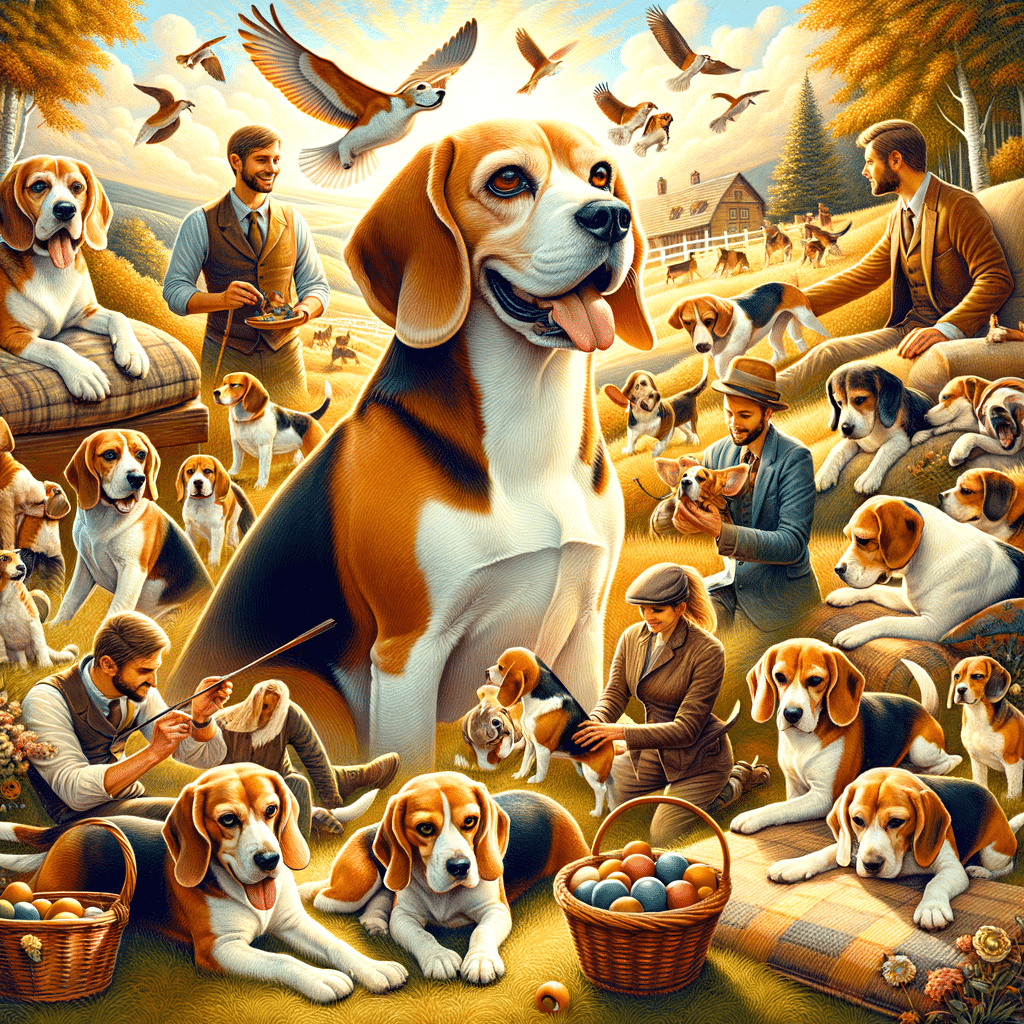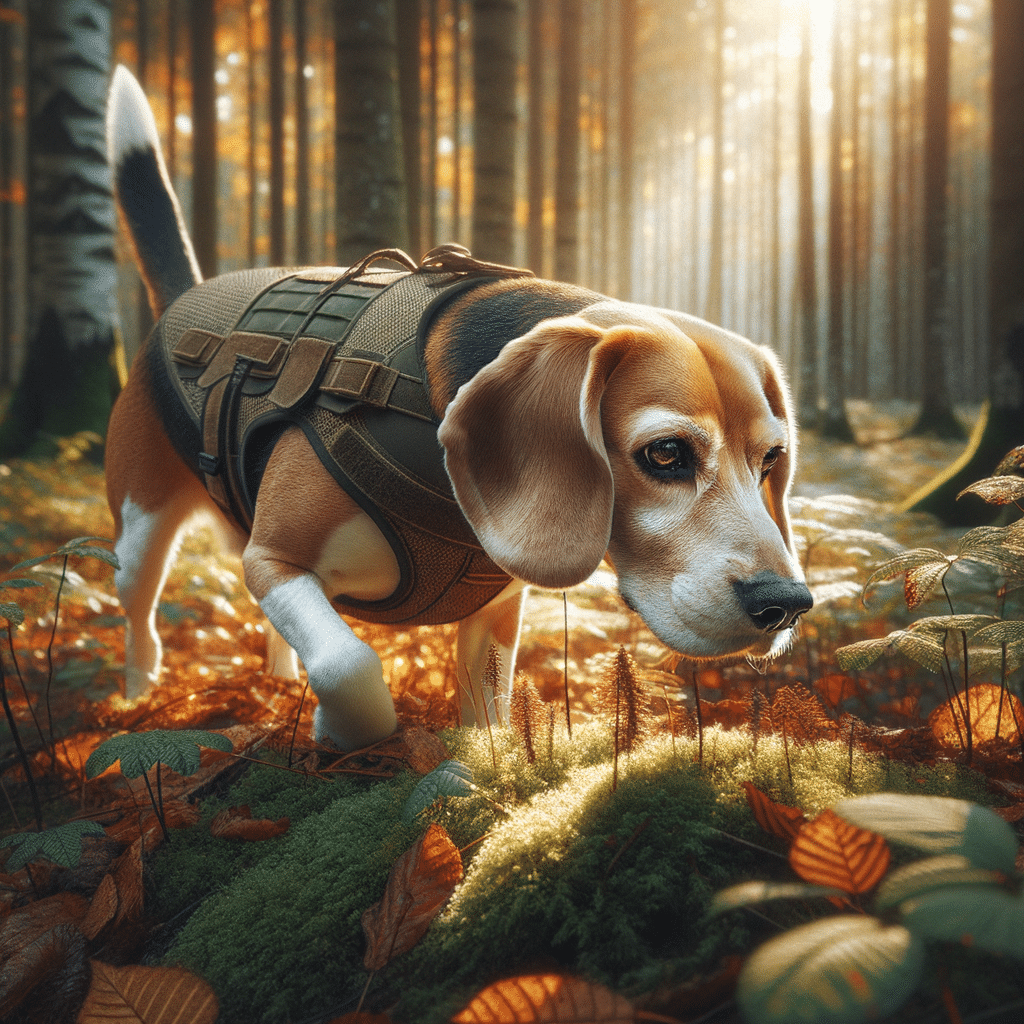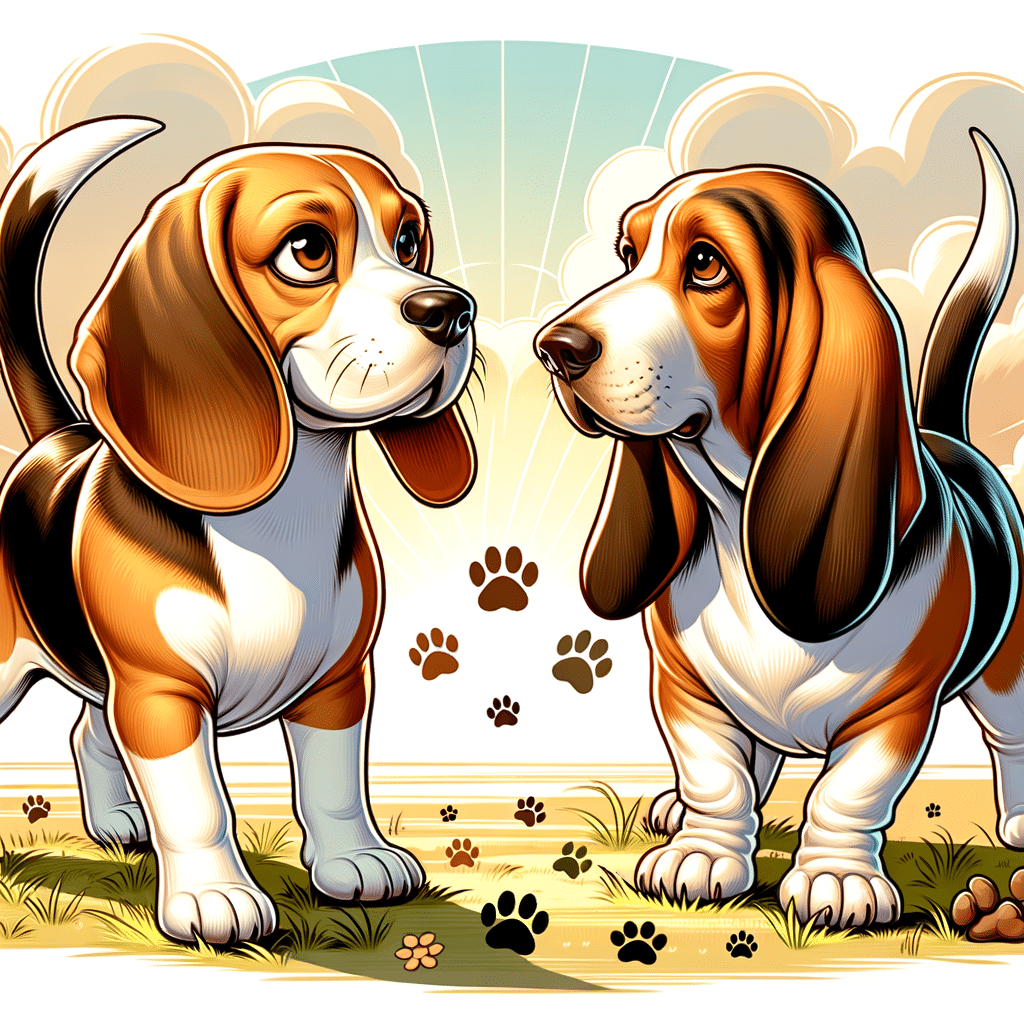Beagles are a popular dog breed renowned for their robustness and friendly demeanor, making them excellent companions for families and active individuals. Originally, they were bred as scent hounds to hunt small game. Their keen sense of smell and instinct for tracking are characteristic traits that also contribute to their curiosity and determination. With a height typically ranging from 13 to 15 inches and weighing between 18 to 30 pounds, beagles are conveniently sized for various living conditions. However, they do best with space to roam and explore.
In This Article
Despite their small stature, beagles possess a strong presence, highlighted by their short coat that comes in any true hound color‚ usually a mix of white, black, brown, tan, red, or lemon. This breed is not just known for its physical attributes; its personality traits are equally notable. Beagles are affectionate with family members, display a charming mix of independence and eagerness for companionship, and generally enjoy being part of the pack.
However, prospective beagle owners should be aware of the breed’s penchant for following their noses, which can sometimes lead to stubbornness, and their need for consistent training and socialization from a young age to foster good behavior and responsiveness.
Highlights
- Beagles are versatile, medium-sized hounds, useful for companionship and hunting due to their keen sense of smell.
- This breed's friendly and curious nature makes them great family pets, requiring attention and space for exercise.
- Consistent training and health maintenance are crucial to managing a beagle's instincts and ensuring a well-adjusted canine.
Historical Background
In the intricate tapestry of dog breed evolution, the beagle’s historical background is rich with development from ancient hounds and its celebrated role in various hunting scenarios to its endearing presence in modern homes and culture.
Beagle History and Origins
The beagle’s ancestry can be traced back to ancient Greece, but its more direct lineage begins in England. Small hounds were utilized to track small game, and these dogs’ traits were honed over centuries. With the Romans’ arrival in England, breeding what would become known as the beagle intensified, adapting to English rabbit hunting needs. These dogs were valued for their compact size, acute sense of smell, and tenacious tracking abilities.
Beagle’s Role in Hunting
Historically, beagles functioned primarily as scent hounds, renowned for their ability to follow a trail over and under challenging terrain. They were not only used for tracking small game like rabbits and hares but, due to their size and temperament, were also a favorite among hunters on foot. Later on, in the United States, the United States Department of Agriculture also employed beagles for scent-detecting roles to intercept contraband foods and substances at US borders.
Recognition and Popularity
The beagle’s journey to recognition began with breed standards established in England. Eventually, the American Kennel Club (AKC) formally recognized the breed in 1885. It has since remained one of the most popular breeds in the United States, not least due to President Lyndon B. Johnson owning several beagles during his tenure.
Different types of beagles, such as the distinctively smaller “pocket beagles,” have catered to various needs and environments. The breed’s ubiquity in popular culture only affirms its status as a cherished member of the canine community.
Physical and Behavioral Traits
The beagle is well-regarded for its compact size and affectionate nature. It reveals a blend of physical endurance tailored for the hunt and a friendly disposition perfect for family life.
Physical Characteristics
- Weight: Typically, beagles weigh between 18 and 30 pounds.
- Height: They stand approximately 13 to 15 inches at the shoulder.
- Coat Length: Their coat is short, making grooming less intensive.
- Coat Color: Beagles possess a range of true hound colors, including a tricolor pattern or black, brown, and white.
Beagle Personality and Temperament
- Temperament: Known for their friendliness, beagles have a warm, playful temperament.
- Energy Level: They are energetic and require adequate exercise to maintain their health and happiness.
- Intelligence: Beagles are intelligent, which can make training both rewarding and challenging.
- Tendency to Bark/Noise: This breed is known for its distinctive bark and howl, especially when it catches a scent.
Beagle Care and Compatibility
- Exercise Needs: Beagles need regular exercise, which can be met with daily walks and playtime.
- Compatibility with Children: They are kid-friendly and make excellent companions for active families.
- Apartment Living: While they are suitable for apartment living, their exercise and noise levels should be considered.
- Coat Care: Their short coat requires minimal grooming compared to longer-coated breeds.
- Human Allergies: Beagles are not hypoallergenic.
A beagle’s temperament usually includes a pleasing expression and an easygoing nature, complemented by their eagerness for companionship and playfulness. Their care involves regular exercise to manage their energy levels, making them suitable for families willing to engage in their active lifestyle.
Health and Maintenance
Maintaining the health of a beagle involves regular grooming, awareness of common health issues, and a proper diet. A careful regime ensures the well-being of these active dogs.
Grooming Essentials
Beagles are low-maintenance in grooming, but regular care is essential to keep them clean and healthy. They have a short coat that does shed. Weekly brushing is recommended to manage shedding. Grooming essentials should include:
- A grooming brush or glove.
- Dog-safe shampoo for occasional baths.
- Ear cleaning products and cotton balls for caring for their floppy ears.
- Dog nail clippers and file.
Common Health Concerns
Beagles are predisposed to specific health issues, which a dog owner should monitor to ensure prompt treatment.
Here are ways to prevent common issues:
- Ear Infections: Consistently check and clean their floppy ears due to their shape and size.
- Obesity: Monitor their weight as they are prone to overeating.
- Epilepsy: Be aware of any signs of seizures and consult a veterinarian if these occur.
- Hypothyroidism: Look out for symptoms like weight gain and lethargy.
- Intervertebral Disc Disease: Keep an eye on back-related issues, especially as they age.
Diet and Nutrition
A balanced diet and nutrition are crucial for a beagle’s health.
Avoid obesity by:
- Measuring their food and limiting food rewards to maintain a healthy weight.
- Providing balanced commercial dog food or a vet-approved homemade diet.
- Ensuring access to clean water at all times.
Do not include foods toxic to dogs, such as chocolate, grapes, or onions. Discussing a beagle’s diet with a veterinarian is also beneficial, as nutritional needs may change with age, activity level, and health conditions.
Training and Socialization
Practical training and socialization are vital to fostering well-adjusted adult beagles. They thrive with positive reinforcement and require mental stimulation to maximize their intelligence and natural trainability.
Basics of Beagle Training
Beagle training should begin with positive reinforcement, rewarding desired behaviors to encourage repetition. They are easy to train due to their eagerness to please and high intelligence.
Start with foundational commands and have short, consistent training sessions to maintain their attention. Early training instills good habits, contributes to their development as excellent family pets, and helps avoid separation anxiety.
- Essential Commands: Sit, stay, come, heel
- Positive Reinforcement: Treats, praise, play
- Session Length: 5-10 minutes, 2-3 times daily
Socializing Your Beagle
Socialization is crucial for beagles from an early age. Exposure to people other than their pet parents, different environments, and other dogs, such as at a dog park, can help prevent behavioral issues.
This breed is naturally friendly, making them ideal family pets, but they benefit from structured interaction to navigate their playfulness and independent thinking. Introducing beagles to new experiences should gradually ensure they remain comfortable and receptive.
- Environments: Dog parks, Urban areas, nature trails
- Interaction: Play dates with other dogs, meeting new people, interacting with other dogs on walks
- Comfort: Keep experiences positive and non-threatening
Engaging Beagle’s Intelligence
Mental stimulation is as vital as daily exercise for beagles. They initially were bred as working dogs, and thrive on tasks that engage their senses, particularly their strong sense of smell. Puzzle toys, scent work, and interactive play can challenge a beagle’s mind. Pet parents can foster their beagle’s intelligence by turning training sessions into fun, rewarding games that keep them mentally and physically active.
- Activities: Puzzle toys, Scent games, Fetch
- Exercise: Regular walks, Hide and seek, Agility courses
- Bonding: Interactive play sessions, training as play
Frequently Asked Questions
This section addresses common inquiries about beagles, focusing on their suitability as family pets, personality traits, physical attributes, cost, and background.
What characteristics make beagles a good choice for family pets?
Beagles are known for their loyalty and good nature, which make them excellent family pets. They are energetic and enjoy playtime, fitting well with active families.
What are the typical personality traits of a beagle?
Common beagle personality traits include determination, energy, and a friendly demeanor. They are known for their strong sense of smell and vocal nature. However, if not handled properly, they can suffer from separation anxiety.
How much does a beagle dog typically weigh?
Adult beagles typically weigh 18-30 pounds, making them a manageable size for most households.
What is the average size of a beagle?
The average height of a beagle is less than 13 inches at the withers for smaller varieties and up to 15 inches for larger ones.
What should you expect to pay for a beagle puppy?
The cost of a beagle puppy from a reputable breeder can vary based on factors such as pedigree and location. Prospective dog owners should research current pricing and ensure they deal with reputable breeders.






